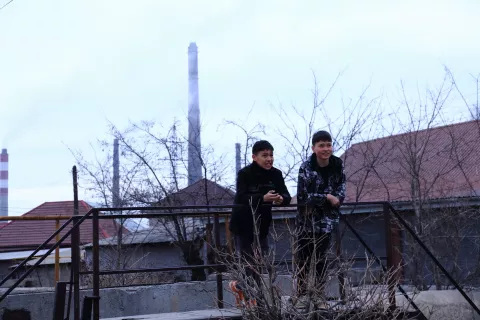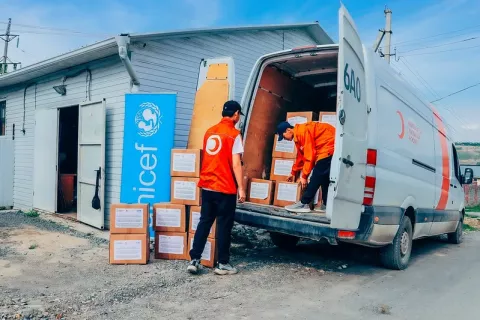EU and UNICEF renew partnership to protect children from disasters in Central Asia and the Southern Caucasus
UNICEF and the European Union have renewed a partnership to support the governments’ efforts to strengthen disaster risk reduction in six countries in Central Asia and South Caucasus and include children as an integral part of their efforts.

The school named after Ch. Aitmatov already teaches the children emergency awareness. But putting the theory into practice made this exercise particularly useful, says school director Dinara Nuralieva.
GENEVA/BISHKEK/BRUSSELS, 31 May 2016 – UNICEF and the European Union have renewed a partnership to support the governments’ efforts to strengthen disaster risk reduction in six countries in Central Asia and South Caucasus and include children as an integral part of their efforts.
The joint initiative will directly benefit more than 2,500 children and teachers in disaster-prone communities as well as representatives from national and local governments in Armenia, Azerbaijan, Kazakhstan, Kyrgyzstan, Tajikistan, and Turkmenistan. The European Commission has provided €800,000 for the new two-year partnership.
”We need to move away from simply managing disasters to reducing risk,” said EU Commissioner for Humanitarian Aid and Crisis Management, Christos Stylianides. “With UNICEF, we have a strong partner in Central Asia and South Caucasus to better prepare communities for natural and man-made disasters; measures which saves lives and livelihoods.”
Given the similarities between the types of natural disasters and climate risks faced by the six countries, such as floods, earthquakes, landslides and extreme cold, the programme will provide a platform for sharing information, experience and practices across the different stakeholders in Central Asia and South Caucasus.
As part of the Country Programmes, UNICEF will continue to work with key government partners, including the emergency, education and social protection ministries, to work together to prepare children and communities so they know what to do when disasters strike and how to reduce disaster risks in the longer-term. This will further advance the progress achieved over the past years under the partnership between UNICEF and the governments in the area of disaster risk reduction.
In Azerbaijan, Tajikistan and Turkmenistan, UNICEF will support the key stakeholders to conduct school safety assessments and develop disaster risk reduction guidelines for schools, and continue to support child-sensitive disaster risk reduction in education and teacher training curricula.
Building on experience gained from previous disaster risk reduction programmes, Armenia, Azerbaijan, Kazakhstan and Kyrgyzstan will work at the municipal level, focusing on improving public policies, legislation, knowledge, education, training and child participation. Central to the approach is the recognition that particular groups of children are vulnerable because of their abilities, gender, age, ethnicity or poverty.
“UNICEF is proud to continue our partnership with the EU to encourage the shift from being reactive to proactive. When children and young people understand the causes, nature and effects of hazards and have the competencies to protect themselves, they act responsibly and become active members in their communities for disaster risk reduction and development,” said Marie-Pierre Poirier, UNICEF Regional Director and Special Coordinator for the Refugee and Migrant Crisis in Europe.
UNICEF and the European Union began work on disaster risk reduction in Uzbekistan in 2007 and has widened the relationship to a multiple country engagement in the region since 2008.
Media contacts
About UNICEF
UNICEF promotes the rights and wellbeing of every child, in everything we do. Together with our partners, we work in 190 countries and territories to translate that commitment into practical action, focusing special effort on reaching the most vulnerable and excluded children, to the benefit of all children, everywhere. For more information about UNICEF and its work in Kyrgyzstan visit: https://www.unicef.org/kyrgyzstan and follow us on Facebook, Instagram and Twitter.
About ECHO
The European Commission's Humanitarian Aid and Civil Protection department (ECHO) is one of the biggest donors for humanitarian aid worldwide. With its funding nearly 20 million victims of natural or man - made disasters are helped each year in about 70 countries. The aid is distributed through 200 partner organizations (Red Cross and Red Crescent Societies, specialized UN agencies, and European NGOs) impartially to those who need it most. For further information please visit: http://ec.europa.eu/echo/index_en.htm




